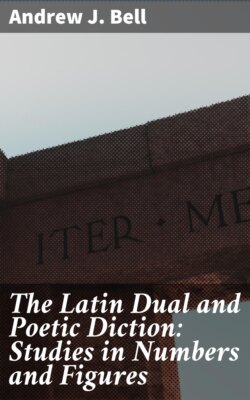Читать книгу The Latin Dual and Poetic Diction: Studies in Numbers and Figures - Andrew J. Bell - Страница 3
На сайте Литреса книга снята с продажи.
PREFACE
ОглавлениеTable of Contents
It will be objected that in our Grammars there stands no mention of a Latin dual. Nor does there stand there any mention of a Latin objective case, or of a Latin aorist. The Latin objective has been obscured by an unfortunate mistranslation of the Greek term αἰτιατική; but the dual did find a place in the oldest Latin Grammars we have, and the term aorist now plays a part in Latin grammatical terminology that seems to me far too great. But in the study of any language the part played by the words not expressed, but to be supplied in the mind of the reader or hearer, is very great, and I have endeavoured in the following pages to determine the origin and nature of some ellipses peculiarly Latin, that have not hitherto been adequately treated.
The ellipsis has in the past played a great part in investigations into Latin syntax; and the reason for this is evident the moment we try to construe into our own tongue a few consecutive verses of Virgil or Horace. But the older grammarians of modern times, such as Sanctius, applied to the solution of the problems thus presented the ellipses familiar to them in their own tongues, instead of endeavouring to discover the ellipses peculiarly Latin. This tendency wrought such mischief in their investigations into Latin syntax that there succeeded to it an opposite tendency to assume as few ellipses as possible in conducting such investigations. In many of the constructions which Sanctius attempted to solve by ellipses this tendency has justified itself; but it soon becomes evident to all students that Latin, like English or French or German, has its peculiar ellipses, and to understand the language they must be determined. In many cases we come to perceive that the words we do not see are of quite as much importance to the meaning as those we do.
For their constant support and sympathy I have especially to thank Chancellor Bowles, and my colleagues, Dean Robertson and Dean Wallace. My colleague in Latin, Professor De Witt, has helped me constantly with suggestions, and I have to thank him especially for his help in the question of Acestes’ arrow. My old friend and class-mate, Professor Keys, has always been ready with sympathy and help, especially in questions affecting the Romance languages. I have further to thank Principal Hutton, Professor Alexander, Mr. Langton, Professor W.P. Mustard, Professor W. Sherwood Fox, and many others, for the kind patience and sympathy with which they have endured my demands on their time and attention. And lastly I have to thank the Board of Regents of Victoria College, whose generous help enables me to publish this book.
A. J. B.
Victoria College.
